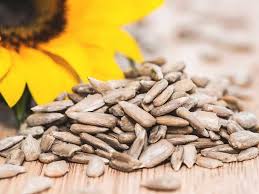Sunflower seeds are packed with healthy fats, essential plant compounds, and an impressive array of vitamins and minerals, which may help reduce the risk of common health issues such as heart disease and type 2 diabetes.

They’re a popular ingredient in snacks like trail mix, nutrition bars, and multi-grain bread, and they’re also a tasty snack on their own. Here’s a comprehensive guide to sunflower seeds, including their nutritional value, health benefits, potential risks, and how to incorporate them into your diet.
What Are Sunflower Seeds?
Sunflower seeds are the edible fruits of the sunflower plant (Helianthus annuus), harvested from the large flower heads, which can reach over 12 inches (30.5 cm) in diameter. Each sunflower head can contain up to 2,000 individual seeds.
There are two primary types of sunflowers: one grown for its edible seeds and another for its oil. The sunflower seeds that you eat are enclosed in striped black-and-white shells, known as hulls, while those used for oil extraction typically have solid black shells.
Sunflower seeds have a mild, nutty taste and a firm yet tender texture. They’re often roasted to enhance their flavor, though you can also find raw varieties.
Nutritional Breakdown of Sunflower Seeds
Sunflower seeds are small but pack a big punch in terms of nutrients. In a 1-ounce (28.35-gram) serving of shelled, dry-roasted sunflower seeds, you’ll get:
-
Calories: 165
-
Total Fat: 14.1 grams
-
Protein: 5.5 grams
-
Carbohydrates: 6.8 grams
-
Fiber: 3.2 grams
-
Vitamin E: 49% of the Daily Value (DV)
-
Niacin (Vitamin B3): 13% of the DV
-
Vitamin B6: 13% of the DV
-
Folate: 17% of the DV
-
Pantothenic acid (Vitamin B5): 40% of the DV
-
Iron: 6% of the DV
-
Magnesium: 9% of the DV
-
Zinc: 14% of the DV
-
Copper: 58% of the DV
-
Manganese: 26% of the DV
-
Selenium: 41% of the DV
Sunflower seeds are particularly rich in Vitamin E and selenium, both powerful antioxidants that help protect the body’s cells from damage caused by free radicals, which are linked to various chronic diseases. Additionally, sunflower seeds provide valuable plant compounds like flavonoids and phenolic acids, which also function as antioxidants.
Sprouting sunflower seeds increases the levels of these plant compounds and can also improve the absorption of minerals. You can find sprouted sunflower seeds in some stores or purchase them online.
Health Benefits of Sunflower Seeds
Sunflower seeds contain nutrients and compounds that can help improve heart health, manage blood pressure, and regulate blood sugar. Here’s a look at some of their most notable health benefits:
1. Reducing Inflammation
While short-term inflammation is a natural part of the immune response, chronic inflammation is a key factor in the development of many diseases. For example, high levels of C-reactive protein (CRP), a marker of inflammation, are linked to an increased risk of heart disease and type 2 diabetes.
In a study of over 6,000 adults, those who consumed sunflower seeds at least five times a week had 32% lower CRP levels than those who ate no seeds. Vitamin E, abundant in sunflower seeds, is known to help reduce CRP levels, and the flavonoids and other plant compounds in the seeds also contribute to anti-inflammatory effects.
2. Promoting Heart Health
High blood pressure is a major risk factor for cardiovascular diseases, including heart attacks and strokes. Sunflower seeds contain bioactive peptides that help relax blood vessels, which can lower blood pressure. Additionally, the magnesium in sunflower seeds further supports healthy blood pressure levels.
Sunflower seeds are also rich in unsaturated fatty acids, especially linoleic acid, which has been shown to relax blood vessels and lower blood pressure. Linoleic acid can also help reduce cholesterol levels. In one study, women with type 2 diabetes who ate 1 ounce (30 grams) of sunflower seeds daily saw a 5% reduction in systolic blood pressure (the top number), and decreases in LDL (bad) cholesterol and triglycerides by 9% and 12%, respectively.
3. Managing Blood Sugar and Diabetes
Sunflower seeds have shown promise in helping regulate blood sugar levels and may be particularly beneficial for people with type 2 diabetes. Some studies suggest that consuming 1 ounce (30 grams) of sunflower seeds daily as part of a balanced diet can reduce fasting blood sugar by about 10% within six months.
This effect may be partly due to chlorogenic acid, a plant compound in sunflower seeds. Additionally, sunflower seeds’ protein, fat, and fiber content slow the digestion of carbohydrates, leading to a more gradual release of sugar into the bloodstream.
Potential Risks and Drawbacks
While sunflower seeds offer numerous health benefits, they come with some potential downsides:
1. High Caloric Content
Sunflower seeds are calorie-dense, so it’s easy to consume too many if you’re not careful. Eating the seeds with their shells can slow your consumption rate since it takes time to crack them open, but if you’re watching your calorie intake, be mindful of portion sizes.
2. Sodium Levels
If you’re watching your sodium intake, be cautious when consuming sunflower seeds, especially those that have been salted. While you may see nutrition information that only reflects the kernels inside the shell, the shells are often coated in salt. Choose unsalted varieties if you’re concerned about sodium levels.
3. Cadmium Exposure
Sunflower seeds contain small amounts of cadmium, a heavy metal that can be harmful to the kidneys if consumed in large amounts over time. Sunflowers absorb cadmium from the soil, so the seeds may have higher levels than other foods. However, eating a reasonable amount (around 1 ounce or 30 grams per day) is unlikely to pose a risk. Just avoid overconsuming sunflower seeds on a daily basis.
4. Bacterial Contamination in Sprouted Seeds
Sprouting sunflower seeds is a popular method, but it can also lead to contamination with harmful bacteria like Salmonella. If consuming sprouted sunflower seeds, make sure they are properly dried at high temperatures to reduce the risk of bacterial growth. If there’s a recall, don’t consume the product.
5. Risk of Stool Blockages
Eating a large quantity of sunflower seeds, especially with their shells, can sometimes lead to fecal impaction, a condition where stool becomes blocked in the intestines. This can cause discomfort, constipation, and may require medical intervention to remove the blockage. It’s important to eat sunflower seeds in moderation and to avoid swallowing shell fragments.
6. Allergic Reactions
While rare, some individuals may be allergic to sunflower seeds. Symptoms can range from mild reactions like itching and swelling to more severe cases of anaphylaxis. People working with sunflower plants, like farmers, or those who feed pet birds sunflower seeds may have a higher risk of developing allergies.
Tips for Enjoying Sunflower Seeds
Sunflower seeds can be eaten in a variety of ways:
-
Add them to trail mix or homemade granola bars.
-
Sprinkle them on salads, yogurt parfaits, or cereal.
-
Use them in stir-fries or as a topping for sautéed vegetables.
-
Add them to pesto or use them as a coating for fish.
-
Blend them into baked goods like breads and muffins.
-
Enjoy sunflower seed butter with fruits like apples or bananas.
If you bake sunflower seeds, be aware that they may turn blue-green due to a chemical reaction with baking soda, but this doesn’t affect the seed’s safety.
Because of their high fat content, sunflower seeds can go rancid over time. Store them in an airtight container in the refrigerator or freezer to keep them fresh.
Final Thoughts
Sunflower seeds are a nutritious, crunchy snack that can be added to a wide variety of dishes. Rich in vitamins, minerals, and healthy fats, they may help reduce inflammation, promote heart health, and support blood sugar regulation.
However, as with any food, it’s important to consume sunflower seeds in moderation to avoid excessive calorie intake and potential side effects.

